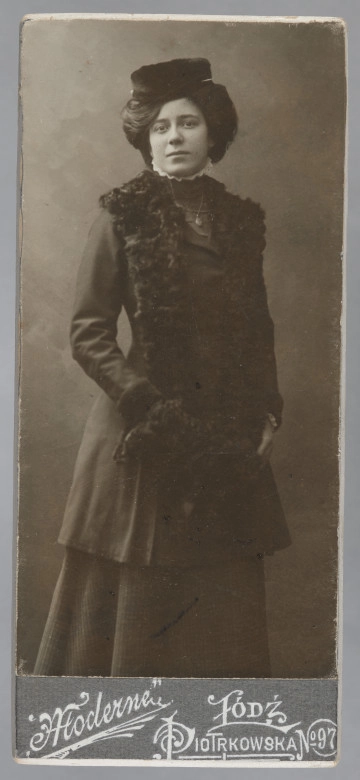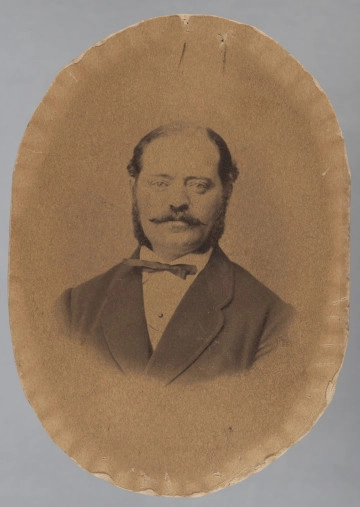
Photograph of Stefania née Grossman (Maybaum / Marzyńska)
c. 1910
Museum of the history of Polish Jews
Part of the collection: Photographs from the collection of Halina Kamińska (Mamelok) née Baruch
The photograph of Stefania née Grossman (Maybaum/Marzyńska) - judging from the resemblance to other images in the photographs, especially the specific smile, which is almost identical to the one in the photograph signed by Halina of Baruch: Stefa. On the back in pen the inscription: me | Westenda?, so the photograph may have been sent, for example, to Diana Baruchova (as were the others, similarly signed: me) as part of her travel correspondence. Agnieszka Wróblewska, who received from Halina of Baruchs Mamelok (Ziuta Kamińska) her photographic archive, apparently misinterpreted the signature me and therefore wrote: Ziutka (confusing Stefania's handwriting with that of, indeed similar, Halina of Baruchs). If the reading of the inscription is correct - then Westenda (with a question mark expressing hesitation, written in the same hand) would be an indication of the Flanders town of Westende, situated on the coast slightly west of Ostend. | The activities of the energetic Maybaumowa/Marzyńska before 1939 are outlined in a note to photograph MPOLIN-A25.1.85. Today, we can only capture some of her work, probably the most impressive of all - that related to official functions. Her various unofficial activities, which attracted public attention, are discovered in historical research, for example, through mentions in the daily press. The following example is significant. In Łódź of the first decades of the 20th century, there existed the Civic Committee to Aid the Poor, which together with its Women's Section appealed to the richer inhabitants of Łódź to feed the poor, especially children. They encouraged people to invite their poor neighbours for daily dinners. One of the newspapers of that time noted the commitment of Stefania Maybaum, who was to serve nutritious soups every day (Gazeta Łódzka [Łódź Newspaper] of 20 September 1914, after: A. Stawiszyńska, Moralne aspekty łódzkiej dobroczynności podczas I wojny światowej. Wybrane spory wokół form pomocy najuboższym [Moral Aspects of Łódź Charity During the First World War. Selected Disputes over the Forms of Helping the Poorest], Rocznik Łódzki [Yearbook of Łódź] 2015, p. 66).
After the war, Stefania Marzyńska was still an active social activist devoted to mothers and children. It is worth quoting the short note And yet the clinics work, which she published in Życie Warszawy [The Life of Warsaw] of 19.11.1957 (p. 6) - on the activities of the Provincial School for Mothers in Łódź, which she directed. Since 1952, the school has been running courses for female graduates of general and vocational schools. These were educational talks on topics - as Stefania Marzyńska wrote - connected with anatomy, motherhood, symptoms and course of pregnancy. Every woman could learn there what a marriage calendar was, what contraceptives were, etc. In the school year 1956/57, 1940 girls listened to our talks.
In the first place, we are not promoting childlessness. We are by no means promoting childlessness. It is also misleading and harmful to our activities to spread the opinion that the Conscious Motherhood Clinic serves only people living in illegal relationships.
We believe that the happiness of motherhood cannot be taken away from a woman, but nevertheless it must be conscious, not the result of chance and unbridled instincts.
PK
Author / creator
Dimensions
cały obiekt: height: 11,8 cm, width: 8,8 cm
Object type
photograph
Technique
photograph
Material
paper
Creation time / dating
Creation / finding place
Owner
POLIN Museum of the History of Polish Jews
Identification number
Location / status

unknown
c. 1910
Museum of the history of Polish Jews

Atelier Moderne (Łódź; 1910-1927)
1910 — 1927
Museum of the history of Polish Jews

Franz Koebcke Photographisches Atelier (Drezno, Kołobrzeg, Koszalin; 18..-?)
2. połowa XIX wieku
Museum of the history of Polish Jews
DISCOVER this TOPIC
Castle Museum in Łańcut
DISCOVER this PATH
Educational path
0/500

We use cookies to make it easier for you to use our website and for statistical purposes. You can manage cookies by changing the settings of your web browser. More information in the Privacy Policy.
We use cookies to make it easier for you to use our website and for statistical purposes. You can manage cookies by changing the settings of your web browser. More information in the Privacy Policy.
Manage cookies:
This type of cookies is necessary for the website to function. You can change your browser settings to block them, but then the website will not work properly.
WYMAGANE
They are used to measure user engagement and generate statistics about the website to better understand how it is used. If you block this type of cookies, we will not be able to collect information about the use of the website and we will not be able to monitor its performance.